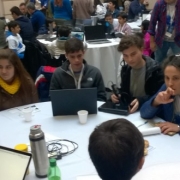Misinformation is also violence
At present, there is no access to official data about the geriatric nursing homes in the province of Córdoba.
From FUNDEPS, we have submitted a request for information to RUGE.PRE.SA, (Registry of Units for the Management of Health Benefits), a body under the Ministry of Health of the Province, responsible, among other things, for regulating and monitoring habilitations of residences for the elderly.
“Below, we offer a google translate version of the original article in Spanish. This translation may not be accurate but serves as a general presentation of the article. For more accurate information, please switch to the Spanish version of the website. In addition, feel free to directly contact in English the person mentioned at the bottom of this article with regards to this topic”.
In the presentation, we required that you inform about the number of residences for elderly people that were in operation in the province of Córdoba; what were the control or monitoring mechanisms on the authorized institutions; and about the control procedures regarding non-qualified institutions, detailing how to proceed in these cases.
The regulations provide for the possibility of presenting these requests for information by the citizenry in order to take cognizance of the acts of the State and, as established by provincial law No. 8803, the State must respond within 10 working days. Having expired this deadline and no response, we present a prompt dispatch whose response period also expired without having been answered.
It is a duty of the State to make this information publicly accessible. We insist on the importance of the publicity of these data, in order to be able to exercise a better control and make visible situations of irregularity. Even more so if we take into account that what is being affected are the rights of a vulnerable group, as are institutionalized older people.
The situation is even more worrying, if we take into account that at the national level there are no unifying norms and establish basic requirements to be met by these residences and that they determine a minimum of rights to be guaranteed in any geriatric residence in the country; on the contrary, the requirements and conditions that a geriatric residence will have to meet to be qualified, depends exclusively on what the local governments establish, which causes great differences among the provinces.
In the Province of Córdoba, Law No. 8,677 and Decree No. 657/09 regulate the operation of private geriatric residences with special emphasis on the physical issues of the establishment, but without advancing on the quality of care. The law does not make considerations regarding the perspective of human rights, socio-health issues and the status of subjects of the people who reside there. As for public residences, it is noted that there are no regulations in the province that regulate them, thus constituting a regulatory gap in this regard.
In a scenario characterized by inequality and an institutional infrastructure still insufficient in terms of protection and exercise of human rights, providing effective responses to accelerated population aging is one of the most important challenges facing the Argentine State and the region. The recent ratification by the Argentine State of the Inter-American Convention on the Protection of the Human Rights of Older Persons, could mean an opportunity to do so.
We must insist that the road to travel is still long. On the one hand, public policies that are designed to reclaim and promote the empowerment of older people are essential. Not only to enable their full participation in the social, economic, cultural and family life of countries, but also to encourage social processes of review of perceptions and representations, generally negative, linked to old age. On the other, it is necessary to think about strategies that allow aging to be positioned at the center of public debate in order to give visibility and interest to a topic that has historically been ignored.
In short, the correct attitudes and policies in this regard will facilitate society’s effective use of the potential of the elderly, thus consolidating the path aimed at the construction of a more inclusive society, where everyone finds their role and opportunities, in tune with your wishes and needs.
We continue to demand the response of the corresponding agencies, while we hope that public policies aimed at full compliance with the human rights of the elderly will be developed.
Author:
Maga Ailén Merlo Vijarra
Contact:
Agustina Mozzoni, agustinamozzoni@fundeps.org




